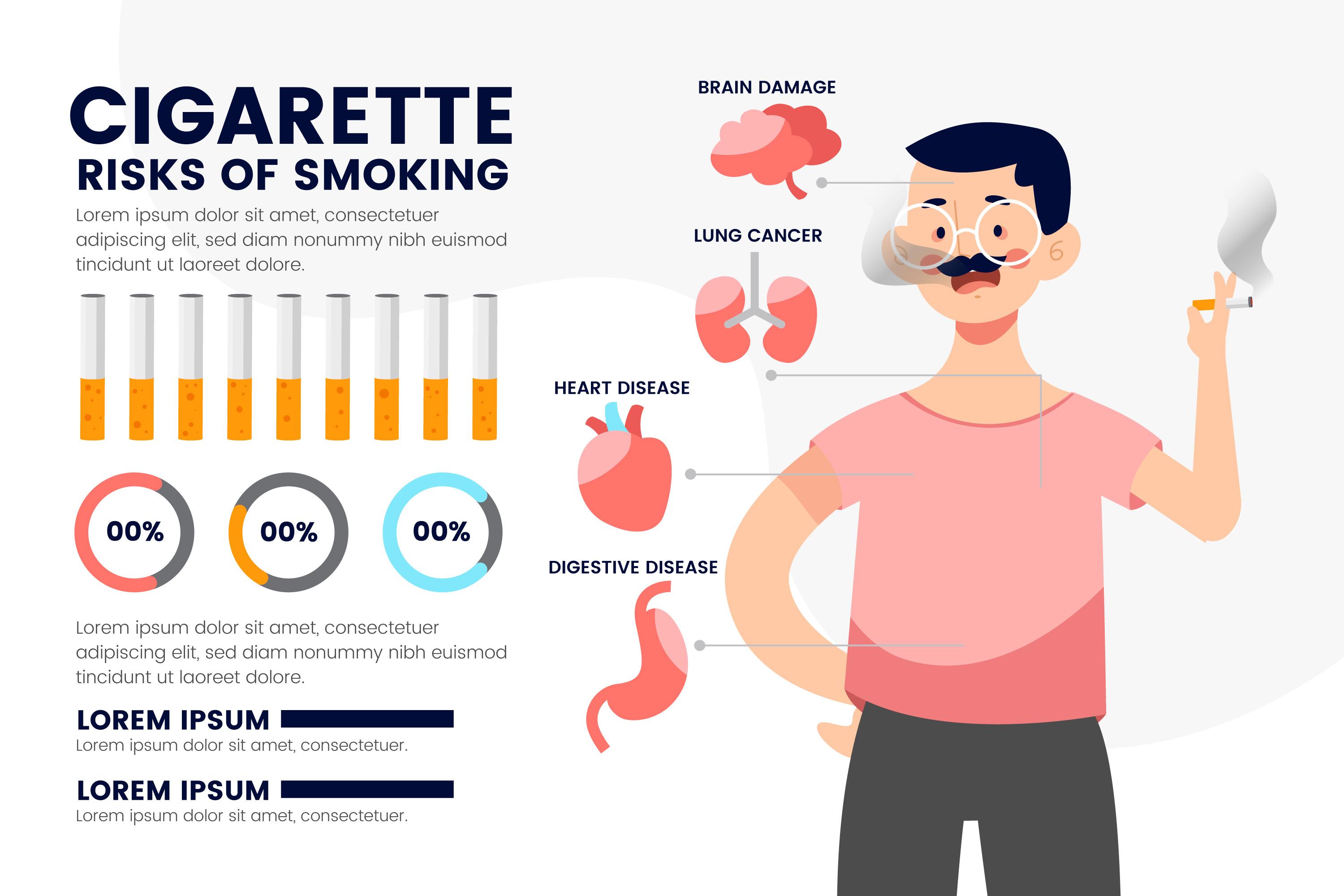Tips for quitting Smoking
Smoking, once considered a glamorous and socially acceptable activity, has evolved into a well-recognized health hazard. As the detrimental effects of
Breaking Free: A Comprehensive Guide to Quitting Smoking and Unveiling the Disadvantages of the Habit
Smoking, once considered a glamorous and socially acceptable activity, has evolved into a well-recognized health hazard. As the detrimental effects of smoking become more apparent, an increasing number of individuals are seeking ways to break free from the clutches of this harmful habit. In this article, we will delve into a comprehensive guide on how to quit smoking and explore the numerous disadvantages associated with this habit.
The Journey to Quitting Smoking
Understanding Nicotine Addiction
To quit smoking successfully, it is crucial to comprehend the addictive nature of nicotine. Nicotine, a powerful stimulant found in tobacco, hooks onto receptors in the brain, leading to dependence. Recognizing this addiction is the first step towards overcoming it.
Set a Quit Date
Select a particular date to quit smoking, allowing yourself sufficient time for mental preparation. Having a concrete goal creates a sense of commitment and urgency.
Seek Support
Notify friends and family about your decision to quit. Establishing a support system can markedly enhance your chances of success. Explore joining a smoking cessation group or seeking professional assistance.
Replace Smoking with Healthy Habits
Identify triggers that make you want to smoke and replace them with healthier alternatives. Engage in activities that keep your hands and mind occupied, such as exercise, hobbies, or meditation.
Nicotine Replacement Therapy (NRT)
NRT products, like nicotine patches or gum, can help manage withdrawal symptoms. Consult a healthcare professional to determine the most suitable option for your situation.
Disadvantages of Smoking
Health Risks
Smoking is a major contributor to various health issues, including lung cancer, heart disease, respiratory disorders, and more. The long-term consequences can be severe and life-threatening.
Financial Drain
Smoking is not only detrimental to health but also to your wallet. Calculate the yearly cost of smoking, including cigarettes, healthcare expenses, and potential productivity losses due to illness. The financial burden may serve as motivation to quit.
Social Stigma
In today's society, smoking is increasingly viewed as socially unacceptable. Smokers often face discrimination, limited social opportunities, and disapproval from non-smokers.
Environmental Impact
Cigarette butts are a major source of environmental pollution. The toxins released from discarded cigarette filters can contaminate soil and water, posing a threat to ecosystems.
Aging and Aesthetic Consequences:
Smoking accelerates the aging process, leading to premature wrinkles, stained teeth, and a yellowish complexion. The aesthetic toll of smoking can be a powerful motivator to quit.
Quitting smoking is a challenging but rewarding journey. By understanding the disadvantages associated with smoking and implementing effective strategies to overcome the addiction, individuals can reclaim their health, financial stability, and social well-being. Breaking free from the chains of smoking is not just a personal triumph but a positive contribution to a healthier and cleaner world.
Overcoming Challenges in the Quitting Process
Dealing with Withdrawal Symptoms:
Nicotine withdrawal symptoms, such as irritability, cravings, and mood swings, can be challenging. Stay hydrated, engage in physical activity, and practice relaxation techniques to manage these symptoms. Remember, these discomforts are temporary and a sign of your body healing.
Celebrate Milestones
Acknowledge and celebrate your achievements along the way. Whether it's one day, one week, or one month without smoking, recognizing your progress reinforces your commitment and boosts your confidence.
Counseling and Therapy
Professional counseling or therapy can provide valuable insights and coping mechanisms during the quitting process. Behavioral therapy, in particular, addresses the psychological aspects of addiction and helps develop strategies to avoid relapse.
Healthy Lifestyle Choices
Adopting a healthier lifestyle can complement your efforts to quit smoking. Emphasize a well-rounded diet, consistent physical activity, and ample rest. A healthy lifestyle enhances overall well-being and resilience against stressors that might trigger the urge to smoke.
Learn from Relapses
If a setback happens, perceive it as a chance to learn rather than a failure. Identify the triggers or situations that led to the relapse and develop strategies to cope with them in the future. Remember, quitting smoking is a process, and setbacks are a natural part of the journey.
Long-Term Benefits of Quitting Smoking
Improved Health
The health benefits of quitting smoking are significant and extend over time. Lung function improves, the risk of heart disease decreases, and the overall likelihood of developing smoking-related illnesses diminishes.
Increased Energy and Vitality
Quitting smoking can lead to increased energy levels and improved vitality. As lung capacity improves, physical activities become easier, and a general sense of well-being is restored.
Enhanced Mental Health
Smoking is often linked to mental health issues such as anxiety and depression. Quitting can positively impact mental health, leading to reduced stress levels, improved mood, and a better quality of life.
Regained Sense of Smell and Taste
Smoking dulls the senses of taste and smell. As the body heals from the effects of smoking, these senses are gradually restored, allowing for a more enjoyable and flavorful experience in daily life.
Positive Impact on Relationships
Quitting smoking can positively influence relationships. Non-smokers are often more appealing to others, and the absence of secondhand smoke contributes to a healthier environment for family and friends.
Quitting smoking is a transformative journey that involves overcoming challenges, understanding the disadvantages of smoking, and embracing the long-term benefits of a smoke-free life. As individuals embark on this path, they not only improve their own well-being but also contribute to building healthier communities. The decision to quit smoking is a powerful commitment to personal growth, health, and a brighter future.
Supporting Others in Their Quitting Journey
Be a Supportive Friend or Family Member:
If someone you know is trying to quit smoking, offer your support without judgment. Be patient, understanding, and encourage their progress. Your positive influence can make a significant difference in their journey.
Be a Supportive Friend or Family Member
If someone you know is trying to quit smoking, offer your support without judgment. Be patient, understanding, and encourage their progress. Your positive influence can make a significant difference in their journey.
Participate in Smoking Cessation Programs
Many communities offer smoking cessation programs. Joining these programs, either individually or as a group, provides a supportive environment where individuals can share experiences, strategies, and encouragement.
Encourage Healthy Habits
Promote activities that contribute to a healthier lifestyle. Suggest engaging in exercise together, exploring new hobbies, or cooking nutritious meals. These positive alternatives can help distract from cravings and reinforce the benefits of a smoke-free life.
Educate About the Disadvantages of Smoking
Share information about the harmful effects of smoking, both short-term and long-term. Knowledge is a powerful motivator, and understanding the risks associated with smoking can strengthen someone's resolve to quit.
Celebrate Milestones Together
Celebrate key milestones with individuals who are quitting smoking. Recognizing achievements, whether big or small, reinforces their commitment and provides positive reinforcement.
Staying Smoke-Free for Life
Build a Strong Support System:
Maintain a network of friends, family, or support groups who understand the challenges of quitting smoking. Having a strong support system provides ongoing encouragement and assistance.
Stay Mindful of Triggers
Identify and be mindful of situations, emotions, or environments that might trigger the desire to smoke. Develop strategies to navigate these triggers without resorting to cigarettes.
Focus on Health and Well-Being
Continue to prioritize a healthy lifestyle by eating well, staying active, and managing stress. A holistic approach to well-being reinforces the positive changes made during the quitting process.
Celebrate the Freedom from Smoking:
Embrace the sense of freedom that comes with being smoke-free. Reflect on the benefits, both physical and mental, and use this newfound freedom as motivation to continue leading a healthy, smoke-free life.
Quitting smoking is a transformative journey that extends beyond individual efforts. By offering support, fostering understanding, and promoting healthier alternatives, we contribute to a collective effort to reduce the prevalence of smoking and improve overall well-being. As we celebrate the victories of those who have successfully quit smoking, we create a ripple effect that inspires others to embark on their own path to a smoke-free and healthier future.




Join the conversation